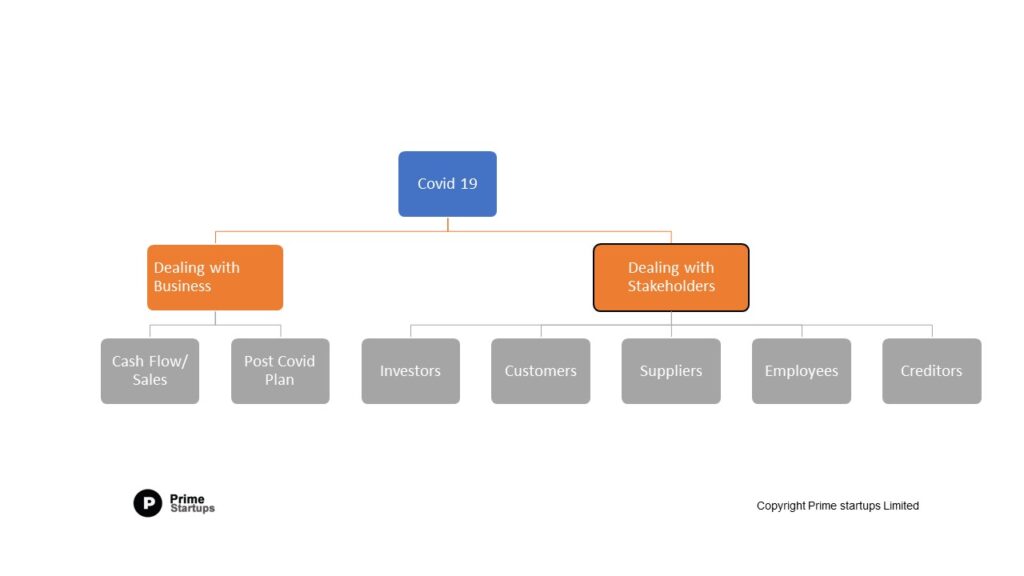Nigeria, along with most nations across the world, is currently trying to mitigate the impact of the coronavirus pandemic. As I write, COVID-19 has killed two people and infected more than 238 in the country, according to the Ministry of Health and the Nigerian Centre for Disease Control (NCDC).
In light of this, the Federal government announced state-wide lockdowns to mitigate the risk of further spread of the disease in the most affected states – Lagos, Ogun and the Federal Capital Territory. In addition to this, various restrictions have also been put in place by Governors of other states. With all these crises, there are some businesses that stand to benefit e.g those that sell essential commodities . However, many startups & SMEs in front-line industries are facing challenges as a result of the pandemic.
According to World Economic forum:
“In recent weeks, we have seen the significant economic impact of the coronavirus on financial markets and vulnerable industries such as manufacturing, tourism, hospitality and travel. Travel and tourism account for 10% of the global GDP and 50 million jobs are at risk worldwide. Global tourism, travel and hospitality companies closing down affects SMEs globally. “
World Economic Forum, 2020
Founders/CEOs are saddled with huge responsibilities: managing dwindling cash flows, hiring and firing decisions, implementing pay cuts and keeping employees motivated in these difficult times.
Needless to say, the coronavirus crisis is a story with many uncertainties, which continues to baffle even the best risk managers. What is certain, however, is that the economic and human impact is catastrophic. The companies that will be preserved afterwards are those with leaders who can take smart decisions to make sure they can keep the light on in scenarios such as this.
Business owners have an obligation to support their employees, assess business challenges and mitigate the effects of the crisis in whatever way they can.
“How companies respond to coronavirus will define their brand for decades”
Mark Cuban , Investor
As an entrepreneur, I have also been affected. In spite of all this, I thought to share my thoughts on how business owners could seize the opportunities that exist, and ride through these trying times.
Firstly, now is the time to conduct a scenario-based impact assessment on how the lockdown is going to affect your business. By carefully making use of leading epidemiological and economic reports of how the pandemic is rapidly evolving. In simple terms, Indicators such as:
- Duration of Ban , Number of People Exposed, Spread rate
- Anticipated date of Normalcy + 1 Month – as so many experts have said governments are overestimating their ability to curtail the spread of the virus
Given the peculiarities of our environment (Nigeria), “e go beta make. …you plan like say you dey plan for Warfare” . I would advise business owners to have a PLAN A, PLAN B, PLAN C to Z, and probably an exit strategy .
I think Plan Z is your exit strategy – i.e. worst case scenario planning. Your action plan should everything fail. Asking yourself that question how would you cash out and move on to a new project, business or life, should Plan A and B fail. The sad reality is that It will take considerable time — as there is a quite high level of uncertainty — before we can be confident that the virus would be curtailed.
It is clear that all businesses are affected, regardless of sector. For most businesses, the pandemic has caused a dramatic decline in business activity, while others suffer supply-chain disruption. Particularly B2C/D2C startups namely hardware startups, manufacturing and retailing companies) .
These startups (especially those more dependent on cash flows) might in due time lack liquidity to fulfill commitments while facing lower demand and could result to cut cost or file for bankruptcies
For now , B2B startups may not be that deeply impacted as they are generally considered to be more capital-efficient and do not require large amounts of investments. Also, when compared to B2C firms, there will be a lag in the impact on these startups.\
Back to the Basics – A closer look at the fundamentals
Coronavirus has underscored the need for business continuity plans particularly in businesses where every operation cannot be done remotely.
For founders, now is the time to activate a business survival plan, re-evaluate plans, goal timelines etc and implement remote working for key- man staff , with a primary focus on capability building and new value creation. The intent of this is to put forward an optimistic, but realistic roadmap to recovery.
Sequoia capital- a Silicon Valley-based Investor, Consulting firms such as Mckinsey , Pwc and among others have all provided guidance on how to ensure the business continuity whilst dealing with potential business consequences of the spreading effects of the coronavirus. One common advice is for business owners to deploy a “Question every Assumption” approach.
Question Every Assumption, for Immediate Business Survival
Question Every Assumption ranging from Cash Flow, Expenses, Continually re-frame your understanding of what’s happening
Staying Alive
One of the primary jobs of a CEO is to manage existential threats. And the number one existential threat right now is running out of capital.
Because situations will differ by organisation, it is important to really think through the various scenarios. as there is no certainty as to when the normalcy will return, one thing is certain

“Hope is not Strategy”
Unknown
My advice, therefore, to founders is to review operating costs and undertake tough measures to keep overall expenses at a minimum,”
For example “If you are a startup with only less than 6 months of runway, you need to act now. You need to be very decisive about how you are going to get yourself more runway.” The mechanisms by which you can achieve this feat is by either growing revenue dramatically and more quickly, cutting costs, or doing both.
Economic experts project that the current lockdown and slowdown in markets will last for the next 6 months. Prepare a list of cash preservation measures (incl. payment delays/selected defaults based on risk level) depending on how the situation evolves
If your main expenses are fixed costs like rent/lease agreements , revisit your essential spending
- Cut down on outsourcing – PR & marketing expenses, as well as random incidental spending on perks.
- Renegotiate Co-working or Lease agreements. and other Contracts with financial obligations falling due in the immediate / short term. Challenge is they are binding agreements and very difficult to get out of.
On a brighter note, due to lockdown fixed operating costs such as diesel/ fuel are out.
If your main expenses are salaries , take a serious look at headcount
- Payrolls/Salaries are often sources of high burn rate. You could either undertake a few measures including negotiate salary cuts, unpaid leave or downsize. LJC shares an interesting article on 50 Alternatives to Layoffs
Take Note: Think carefully about a reduction in force . As a founder, you have the moral obligation to treat your staff as you would want to be treated.
A good example would be in sports. In the Interest of the majority, Football teams such as Barcelona and Arsenal Team Players are voluntarily taking a 70% pay cut and NBA players are donating full salaries to take care of salaries of operational workers amid suspended season.
Raising more money from Investors
This might be extremely difficult at the moment except you have existing investors. As macro environment play a key role on fundraising outcomes. Many investors at the moment are sitting and observing the situation as well. So it’s best to assume it will be very difficult to raise financing in the next 3 – 6 months+.
However If you need to fund raise today,
- Start with your existing investors and ask them how much they may be willing to invest and at what price.
- Then reach out to other investors who you have gotten to know well or who have tracked your journey for the last few years to gauge their interest.
*Of course, there is no one-size-fits-all solution* but with some wit and courage, business can still go on.
In Conclusion, as Darwin surmised,
Those who survive are not the “strongest or the most intelligent, but the most adaptable to change.”
Charles Darwin













